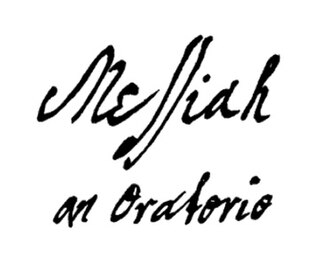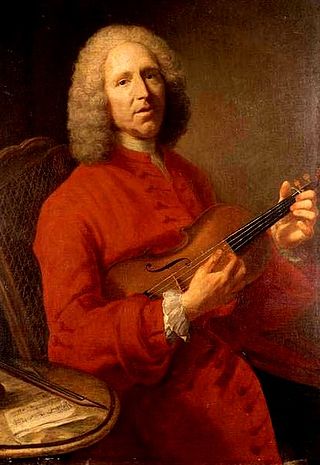
George FridericHandel was a German-British Baroque composer well known for his operas, oratorios, anthems, concerti grossi, and organ concertos. Handel received his training in Halle and worked as a composer in Hamburg and Italy before settling in London in 1712, where he spent the bulk of his career and became a naturalised British subject in 1727. He was strongly influenced both by the middle-German polyphonic choral tradition and by composers of the Italian Baroque. In turn, Handel's music forms one of the peaks of the "high baroque" style, bringing Italian opera to its highest development, creating the genres of English oratorio and organ concerto, and introducing a new style into English church music. He is consistently recognized as one of the greatest composers of his age.

Samson and Delilah, Op. 47, is a grand opera in three acts and four scenes by Camille Saint-Saëns to a French libretto by Ferdinand Lemaire. It was first performed in Weimar at the Grossherzogliches Theater on 2 December 1877 in a German translation.

Samson was the last of the judges of the ancient Israelites mentioned in the Book of Judges and one of the last leaders who "judged" Israel before the institution of the monarchy. He is sometimes considered as an Israelite version of the popular Near Eastern folk hero also embodied by the Sumerian Gilgamesh and Enkidu, as well as the Greek Heracles. Samson was given superhuman powers by God in the form of extreme strength.

Semele is a 'musical drama', originally presented "after the manner of an oratorio", in three parts by George Frideric Handel. Based on an existing opera libretto by William Congreve, the work is an opera in all but name but was first presented in concert form at Covent Garden theatre on 10 February 1744. The story comes from Ovid's Metamorphoses and concerns Semele, mother of Bacchus. Handel also referred to the work as 'The Story of Semele'. The work contains the famous aria "Where'er you walk".

Delilah is a woman mentioned in the sixteenth chapter of the Book of Judges in the Hebrew Bible. She is loved by Samson, a Nazirite who possesses great strength and serves as the final Judge of Israel. Delilah is bribed by the lords of the Philistines to discover the source of his strength. After three failed attempts at doing so, she finally goads Samson into telling her that his vigor is derived from his hair. As he sleeps, Delilah cuts Samson's hair, thereby enabling her to turn him over to the Philistines.

Israel in Egypt, HWV 54, is a biblical oratorio by the composer George Frideric Handel. Most scholars believe the libretto was prepared by Charles Jennens, who also compiled the biblical texts for Handel's Messiah. It is composed entirely of selected passages from the Old Testament, mainly from Exodus and the Psalms.

Saul is a dramatic oratorio in three acts written by George Frideric Handel with a libretto by Charles Jennens. Taken from the First Book of Samuel, the story of Saul focuses on the first king of Israel's relationship with his eventual successor, David—one which turns from admiration to envy and hatred, ultimately leading to the downfall of the eponymous monarch. The work, which Handel composed in 1738, includes the famous "Dead March", a funeral anthem for Saul and his son Jonathan following their deaths in the Battle of Mount Gilboa at the hands of the Philistines, and some of the composer's most dramatic choral pieces. Saul premiered successfully at the King's Theatre in London on 16 January 1739, and was revived by Handel in subsequent seasons. Notable modern-day performances of Saul include that at Glyndebourne in 2015.

Athalia is an English-language oratorio composed by George Frideric Handel to a libretto by Samuel Humphreys based on the play Athalie by Jean Racine. The work was commissioned in 1733 for the Publick Act in Oxford – a commencement ceremony of the University of Oxford, which had offered Handel an honorary doctorate. The story is based on that of the Biblical queen Athaliah. Athalia, Handel's third oratorio in English, was completed on 7 June 1733, and first performed on 10 July 1733 at the Sheldonian Theatre in Oxford. The Bee reported that the performance was "performed with the utmost Applause, and is esteemed equal to the most celebrated of that Gentleman's Performances: there were 3700 Persons present".

Judas Maccabaeus is an oratorio in three acts composed in 1746 by George Frideric Handel based on a libretto written by Thomas Morell. The oratorio was devised as a compliment to the victorious Prince William Augustus, Duke of Cumberland upon his return from the Battle of Culloden. Other catalogues of Handel's music have referred to the work as HG xxii; and HHA 1/24.

Jephtha is an oratorio (1751) by George Frideric Handel with an English language libretto by the Rev. Thomas Morell, based on the story of Jephtha in Judges and Jephthes, sive Votum (1554) by George Buchanan. Whilst writing Jephtha, Handel was increasingly troubled by his gradual loss of sight, and this proved to be his last oratorio. In the autograph score, at the end of the chorus "How dark, O Lord, are thy decrees" he wrote "Reached here on 13 February 1751, unable to go on owing to weakening of the sight of my left eye."

Esther is an oratorio by George Frideric Handel. It is generally acknowledged to be the first English oratorio. Handel set a libretto after the Old Testament drama by Jean Racine. The work was originally composed in 1718, but was heavily revised into a full oratorio in 1732.

Solomon, HWV 67, is an oratorio by George Frideric Handel. The anonymous libretto – currently thought to have been penned by the English Jewish poet/playwright Moses Mendes (d.1758) – is based on the biblical stories of the wise king Solomon from the First Book of Kings and the Second Book of Chronicles, with additional material from Antiquities of the Jews by ancient historian Flavius Josephus. The music was composed between 5 May and 13 June 1748, and the first performance took place on 17 March 1749, with Caterina Galli in the title role at the Covent Garden Theatre in London, where it had two further performances. Handel revived the work in 1759.

Joshua is an oratorio by George Frideric Handel. It was composed in a month, from 19 July 1747 to 19 August 1747, six months before the beginning of the oratorio season. Joshua is Handel's fourth oratorio based on a libretto by Thomas Morell. The oratorio premiered on 9 March 1748 at the Covent Garden Theatre, London. Joshua is based on the Biblical story of Joshua as the leader of the ancient Israelites. The story follows the Israelites from their passage over the Jordan River into Caanan and through the Battle of Jericho. The work also includes a love story elaborated from a few hints in the Biblical narrative between Caleb's daughter Achsah and Othniel, a young soldier.

Deborah is an oratorio by George Frideric Handel. It was one of Handel's early oratorios in English and was based on a libretto by Samuel Humphreys. It received its premiere performance at the King's Theatre in London on 17 March 1733.
Samson was a character in the Biblical Book of Judges. He is said to have been raised up by God to deliver the Israelites from the Philistines. In the story, God grants him unusual strength, which is facilitated by a Nazirite vow prohibiting him from cutting his hair. His strength and violent temper are illustrated in several colorful stories portraying him as dominant over man and nature. He also succeeds in his charge to battle the Philistines, more through acts of personal vengeance than by any formal military strategy. Eventually the Philistines defeat him by bribing his new love interest, Delilah, into extracting from him the secret to his strength. Once learned, the Philistines cut his hair while he sleeps, at which point he is easily defeated.

The Handel organ concertos, Op. 4, HWV 289–294, are six organ concertos for chamber organ and orchestra composed by George Frideric Handel in London between 1735 and 1736 and published in 1738 by the printing company of John Walsh. Written as interludes in performances of oratorios in Covent Garden, they were the first works of their kind for this combination of instruments and served as a model for later composers.

Messiah, the English-language oratorio composed by George Frideric Handel in 1741, is structured in three parts, listed here in tables for their musical setting and biblical sources.

Messiah, the English-language oratorio composed by George Frideric Handel in 1741, is structured in three parts. This listing covers Part III in a table and comments on individual movements, reflecting the relation of the musical setting to the text. Part I begins with the prophecy of the Messiah and his birth, shows the annunciation to the shepherds as a scene from the Gospel of Luke, and reflects the Messiah's deeds on Earth. Part II covers the Passion, death, resurrection, ascension, and the later spreading of the Gospel. Part III concentrates on Paul's teaching of the resurrection of the dead and Christ's glorification in heaven.

Samson was an opera by the French composer Jean-Philippe Rameau with a libretto by Voltaire. The work was never staged due to censorship, although Voltaire later printed his text. Rameau intended the opera on the theme of Samson and Delilah as the successor to his debut Hippolyte et Aricie, which premiered in October 1733. Like Hippolyte, Samson was a tragédie en musique in five acts and a prologue. Voltaire had become a great admirer of Rameau's music after seeing Hippolyte and suggested a collaboration with the composer in November 1733. The opera was complete by late summer 1734 and went into rehearsal. However, a work on a religious subject with a libretto by such a notorious critic of the Church was bound to run into controversy and Samson was banned. An attempt to revive the project in a new version in 1736 also failed. The score is lost, although Rameau recycled some of the music from Samson in his later operas.

Samson is a 2018 South African-American Biblical drama film directed by Bruce Macdonald and inspired by the story of Samson in the Book of Judges. The film stars Taylor James as Samson, along with Jackson Rathbone, Billy Zane, Caitlin Leahy, Rutger Hauer, and Lindsay Wagner. The film was released in the United States on February 16, 2018. It was negatively reviewed by film critics and was a box office bomb.














